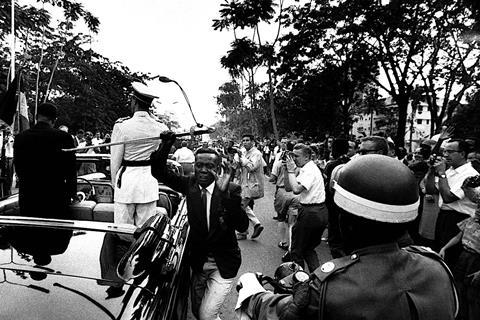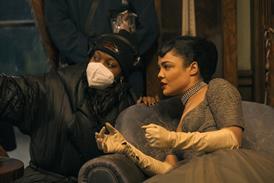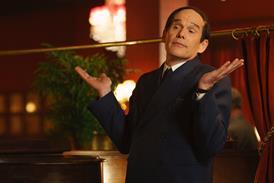Outstanding documentary ties the democratic movement in Africa in the 1960s with Black US musicians used by the CIA as pawns in the Cold War

Dir/scr: Johan Grimonprez. Belgium/France/Netherlands. 2024. 150 mins.
This thrilling, galvanising essay film explores a particularly inglorious chapter in the history of the Cold War: the neo-colonial manoeuvring that led to the 1961 murder of Patrice Lumumba, the elected Prime Minister of the newly independent Democratic Republic of Congo. Belgian director Johan Grimonprez explores his birth country’s role, along with America’s Eisenhower administration, in the assassination of Lumumba, while deftly tying together the wider context with the music of American Jazz legends such as Louis Armstrong and Dizzy Gillespie, artists used by the US as a smokescreen to conceal the CIA’s interference in Africa. It’s a remarkable film – exhaustive, informative and rigorously researched, but also crackling with energy , ideas and formal daring.
A remarkable film – exhaustive, informative and rigorously researched, but also crackling with energy, ideas and formal daring
Grimonprez’s previous work includes the 1997 essay film dial H-I-S-T-O-R-Y, made in collaboration with Don Delillo, Double Take (2009) and Shadow World (2016), which explored the global arms trade and won best documentary at the Edinburgh International Film Festival. In comparison, Soundtrack To A Coup D’Etat represents something of a magnum opus, its 150-minute running time dwarfing his earlier works. But it’s a testament to the intellectual agility of Grimonprez’s approach and to the skill of editor Rik Chaubet that at no point does the picture feel unwieldy or overlong. With its dual focus on music and African politics, the film has a kinship with Lee Hirsch’s 2002 film Amandla! A Revolution in Four Part Harmony, which explored the role of music in the fight against Apartheid in South Africa. But Soundtrack To A Coup D’Etat is more intricate, ambitious and far-ranging in its scope. It should enjoy a warm reception at festivals and elsewhere, and could find itself mentioned in awards conversations going forward.
The moment in which American jazz and African politics collided in the public consciousness came in February 1961, when singer Abbey Lincoln and drummer Max Roach were among protestors who broke into the UN Security Council to protest the murder of Prime Minister Patrice Lumumba. But the film draws in together a wider context, through extensive archive footage and numerous quotes from key players (helpfully provided with citations detailing the source material).
In 1960, with the admission of 16 newly independent African countries to the UN, the Cold War found a new battlefield. A focus of this was the Democratic Republic of Congo, of strategic and global importance because of its rich natural resources (not least its supplies of uranium) and position at the heart of Africa. New Prime Minister Patrice Lumumba was his own man, not the tame leader favoured by the wealthy countries which were keen to keep a finger firmly wedged in the Congo’s generously-stuffed pie. The document confirming his rightful status as the new leader of the DRC had to be smuggled out of the country in the chignon hairpiece of his charismatic advisor and speechwriter, women’s rights activist Andrée Blouin. Blouin, whose writing is narrated by Belgian-Congolese musician Marie Daulne, is a fascinating character in her own right, an influential figure in post-colonial Africa who was smeared as a communist and a courtesan by the Belgian secret service.
Meanwhile, as part of the US campaign to cement its influence in Africa over that of the rival USSR, Black jazz ambassadors are pressed into service, performing in various African countries and winning the hearts of the African people, unaware that the CIA is using them as a distraction. Then there’s the further issue for the musicians of reconciling themselves with the fact that the country they are representing is still racially segregated. The use of music – along with American jazz musicians, the picture also incorporates Congolese artists – is crucial to the picture’s success: skittish jazz drum breaks inform the editing and the free-form leaps between themes and ideas. Political history has never felt so energising and dynamically alive as it does here.
Production company: Onomatopee Films, Warboys Films
International sales: Mediawan Rights arianna.castoldi@mediawan.com
Producer: Daan Milius, Rémi Grellety
Editing: Rik Chaubet
Featuring: Louis Armstrong, Dizzy Gillespie, Abbey Lincoln, Max Roach, Nina Simone, Miriam Makeba, John Coltrane, Duke Ellington, Melba Liston, Eric Dolphy, Charles Mingus, Ornette Coleman, Andrée Blouin, Nikita Khrushchev, In Koli Jean Bofane, Malcolm X, Conor Cruise O’Brien, Allen Dulles, John F. Dulles





















